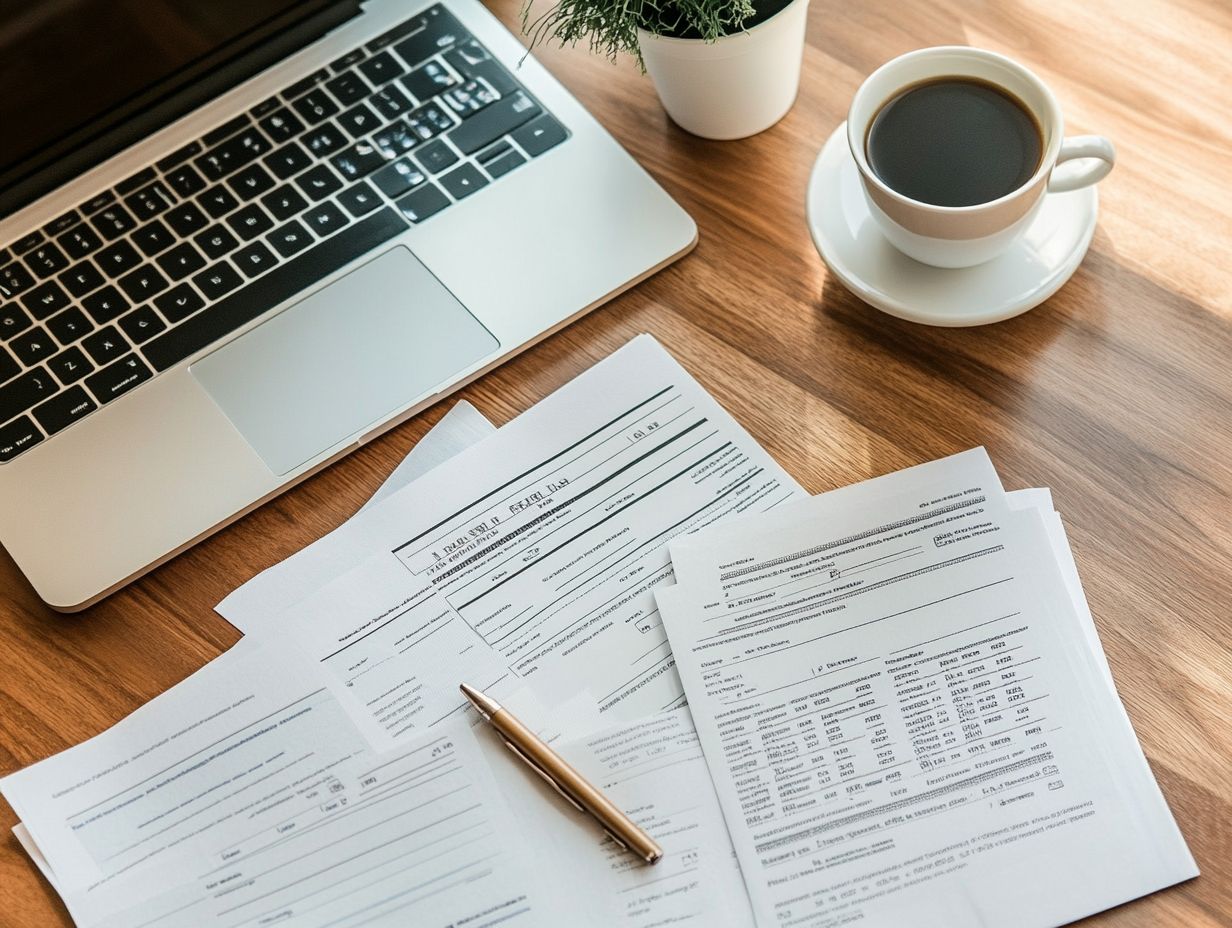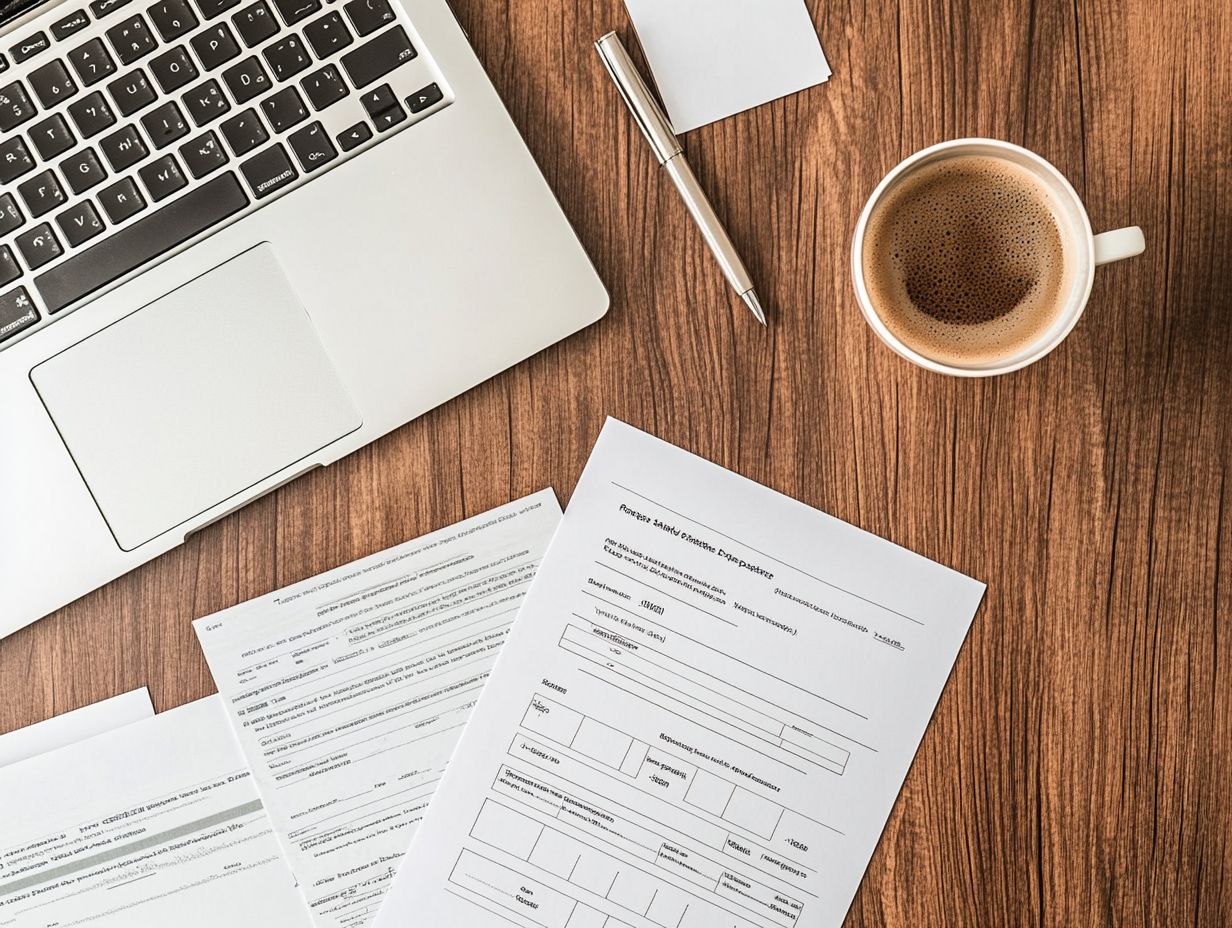What Documents Do I Need for a Mortgage?
Navigating the world of mortgages can feel like an uphill battle, especially when it comes to deciphering the necessary documentation.
Whether you re a first-time homebuyer or considering a refinance, understanding what’s required can significantly streamline your process and pave the way for success.
This guide outlines the essential documents you ll need, from personal identification and proof of income to specific requirements tailored for self-employed individuals and investment properties.
You’ll also find valuable tips on how to gather and organize these documents effectively. Dive in to make your mortgage journey smoother and more informed.
Contents
Key Takeaways:

- Provide personal identification and proof of income.
- Include employment history, bank statements, credit history, and proof of assets.
- Check with your lender for specific requirements based on your situation.
- Organize your documents early to speed up the process.
Understanding Mortgages
Understanding mortgages is crucial for anyone contemplating a home loan. It involves various types, such as FHA loans, VA loans, and USDA loans, each with its own set of lender requirements and benefits.
The mortgage application process can be overwhelming. It requires a close look at your finances.
Key factors like your debt-to-income ratio, which compares what you owe to how much you earn, and FICO score significantly influence your eligibility and the terms of your loan.
Knowing about potential closing costs is important, as it gives you the power to make well-informed decisions throughout your home-buying journey.
What is a Mortgage?
A mortgage is a specialized home loan tailored to facilitate the purchase of real estate, with the property itself serving as collateral for the agreement.
This financial arrangement gives you the power to secure your dream home while comfortably repaying the borrowed amount over an extended timeline.
The principal refers to the original amount you borrow, while the interest rate dictates the cost of borrowing, influencing your monthly payments and the total amount you’ll repay over time.
Your mortgage contract will encompass various legal stipulations that delineate the rights and responsibilities of both you and the lender. Typically, it requires you to maintain insurance on the property and pay property taxes, ensuring that your collateral remains safeguarded throughout the life of the loan.
Types of Mortgages
There are several types of mortgages available to you as a homebuyer. These include FHA loans, VA loans, USDA loans, and conventional loans, each catering to different financial needs.
Understanding the nuances of these mortgage options can significantly enhance your homebuying experience. For instance, FHA loans are well-known for their low down payment requirements, making them particularly advantageous for first-time homebuyers or those with less-than-perfect credit.
VA loans provide unique benefits for veterans, such as no down payment and competitive interest rates. This makes them an excellent choice for those who have served in the armed forces.
USDA loans, designed for buyers in rural areas, also allow for zero down payment options, though they come with specific income eligibility restrictions.
On the flip side, conventional loans typically require higher credit scores but can provide flexibility regarding loan amounts and property types.
By carefully comparing these features, you can select the mortgage type that best aligns with your financial situation and homeownership goals.
Documents Required for a Mortgage

Navigating the mortgage application process demands a meticulous collection of financial documents.
You’ll need to gather your:
- tax returns
- pay stubs
- bank statements
- credit reports
This comprehensive documentation enables lenders to accurately assess your financial standing and make informed decisions regarding your application.
Personal Identification
You need a government-issued photo ID to verify your identity during the mortgage application. This simple step builds trust with your lender.
This requirement is key to establishing credibility between you and the lender. By providing valid personal identification, you not only meet the lender’s requirements but also help prevent fraud, making the approval process smoother.
Lenders depend on this documentation to confirm your identity, which is crucial for safeguarding both parties in a significant financial transaction. Having the appropriate identification streamlines the lending process and instills confidence in the entire transaction.
Proof of Income
You must show proof of income to apply for a mortgage. This proves you can handle your loan payments.
You typically need to provide documents like pay stubs and tax returns to help lenders assess your financial stability.
If you’re self-employed, be ready to submit additional documentation, such as profit and loss statements or bank statements, to give lenders a clearer view of your income flow. If you are a contract worker or freelancer, presenting invoices or client agreements can also substantiate your earnings.
Each of these documents is vital for demonstrating your ability to repay a loan and influencing your loan eligibility. Lenders review these materials carefully to evaluate risk.
Securing the appropriate proof of income is more than a formality; it can significantly impact your interest rates and the loan amounts available to you.
Employment History
Your employment history is vital for mortgage approval. Lenders look for job stability and steady income.
To evaluate this important aspect, lenders generally require detailed documentation, including:
- Pay stubs
- Tax returns
- W-2 forms from the past two years
This information helps lenders assess your earning potential and job continuity. They often verify employment through direct communication with your employers to ensure the information is accurate and up-to-date.
Lenders may also consider the nature of your profession and how it aligns with your financial needs. A robust work history can help secure favorable mortgage terms.
Bank Statements

Bank statements are key in your mortgage application. They show lenders your financial health and how well you manage money.
These documents allow lenders to evaluate your income, spending habits, savings patterns, and overall liquidity essential factors in assessing your creditworthiness.
They serve as a reliable verification source, complementing other essential documentation like pay stubs and tax returns.
When these elements come together, they create a holistic view of your financial stability, reassuring lenders that you are prepared to handle monthly payments.
This thorough analysis shapes lending decisions, allowing both you and the lender to proceed with confidence in this significant financial commitment.
Credit History
Your credit history is critical for getting a mortgage. Lenders review your credit reports to understand your financial responsibility.
A robust credit history boosts your chances of loan approval and opens the door to more favorable interest rates and terms. Lenders scrutinize your repayment patterns, outstanding debts, and overall financial management.
Maintaining a solid credit score is essential; it signals to lenders that you are a reliable borrower. By checking your credit reports for inaccuracies and ensuring bills are paid on time, you can enhance your creditworthiness.
This proactive approach positions you as a low-risk candidate for mortgage financing, making your application more appealing. You ve got this!
Proof of Assets
Providing proof of your assets, like bank statements or financial documents, is crucial for showing financial stability during the mortgage application process. This documentation is vital for lenders assessing your repayment ability.
Reviewing your assets gives financial institutions insights into your wealth management and cash availability. A strong asset profile can enhance your chances of securing favorable loan terms, such as lower interest rates and reduced down payments.
This not only highlights your preparedness but also reinforces your credibility in real estate financing.
Documents That May Be Needed
Along with the standard documents, you may need additional paperwork based on your situation. This might include gift letters or specific documentation for self-employed individuals, investment properties, or refinancing.
For Self-Employed Individuals

Self-employed individuals face unique challenges in the mortgage application process. You often need to provide extensive documentation, including detailed tax returns and proof of income.
Lenders require extra scrutiny to assess your financial stability and income consistency. Be prepared to submit two years of personal and business tax returns, along with profit and loss statements from your business.
A Letter of Verification from your accountant can strengthen your application. These documents help lenders understand your financial situation better.
For Investment Properties
When applying for a mortgage on investment properties, lenders look for additional documentation to gauge potential rental income and related risks. This usually includes tax returns, bank statements, and proof of income from other investments.
Showcasing your experience as a landlord can significantly influence the lender’s risk assessment. Many institutions prefer to see reserves that cover a few months mortgage payments, boosting confidence in your financial management.
By understanding these requirements, you can streamline your application process and enhance your chances of securing favorable loan terms.
For Refinancing
Refinancing a mortgage typically requires documentation similar to your initial application, including updated financial records and proof of current income. Be ready to provide bank statements, tax returns, and details about any outstanding debts.
Unlike the original application, refinancing focuses more on your current financial situation than on the property’s initial appraisal. This shift shows your ability to manage debt effectively and improve your creditworthiness since securing the last mortgage.
Understanding these nuances can make refinancing smoother and more efficient, leading to significant benefits for homeowners seeking lower interest rates or modified loan terms.
Tips for Gathering and Organizing Documents
Gathering and organizing your documents for a mortgage is not just a task. It can make your life easier during a stressful time!
Develop a clear strategy for managing your financial documents. This ensures everything is in order and easily accessible when needed.
Frequently Asked Questions
What Documents Do I Need for a Mortgage?
When applying for a mortgage, you will need to provide various documents to your lender to verify your identity, income, and financial stability.
What personal documents do I need?
You will need to provide a valid form of identification, such as a driver’s license or passport, as well as your Social Security number.
What income documents do I need?
Be prepared to provide pay stubs from the past 2-3 months, W-2 forms (which show how much money you’ve earned and how much tax was withheld) from the past 2 years, and tax returns from the past 2 years.
What assets and liabilities documents do I need?
You will need to share any assets you own, such as bank statements, investment accounts, and property titles.
You will also need to provide information on any outstanding debts, such as credit card balances, car loans, and student loans.
What additional documents do I need if self-employed?
If you are self-employed, you will need to provide additional documents such as business tax returns, profit and loss statements, and a balance sheet to show your company’s financial standing.
What documents do I need for a pre-approval?
For a pre-approval, you will need to provide all the same documents as a regular mortgage application, including personal, income, and asset/liability documents.
You may also need to submit a signed letter from your employer stating your salary and employment status.
Collect these documents now to speed up your mortgage application!






